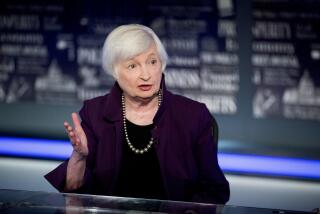Canadian Firm Puts Quebec’s Bonds on Watch : Credit: Political uncertainty prompted the suspension of the AA rating held by the province, which is a major player in the bond market.
- Share via
TORONTO — A Canadian bond-rating company has put all debt instruments issued by the province of Quebec on a credit watch, sending a warning signal to international investors about the growing political uncertainty in Canada’s Francophone province.
“The uncertainty surrounding the future of Quebec within Canada has reached unprecedented levels,” said Montreal-based Canadian Bond Rating Service Ltd. in a written statement. “It has become impossible to predict with any satisfactory level of confidence the level of risk to bondholders.”
Issuance of a credit watch means Canadian Bond Rating Service has suspended its previous AA rating of Quebec’s debt instruments and will monitor developments before setting a new rating.
Quebec is a major player in international bond markets, with about $44 billion in provincial debt outstanding. In the so-called Yankee Market of foreign investors in New York, Quebec is the second-largest debt issuer, after the World Bank. Analysts say that, in general, about half of Canadian public debt is held by foreign investors.
Of Quebec’s outstanding debt, about $22 billion was issued by Hydro-Quebec, the province’s huge, government-owned electric utility. Hydro-Quebec has become a major debt issuer in recent years as it has grown and boosted its capacity to export electricity to the northeastern United States.
Ihor Kots, vice president and director of Canadian Bond Rating Service, said the decision to impose a credit watch was not prompted by any particular event, although last weekend the Quebec Liberal Party, which governs in the province, voted in a radical, politically significant new platform.
The Liberals are dedicated to working toward a total restructuring of the Canadian confederation during the next 18 months; failing that, they want the government to call a vote on Quebec independence in 1992. The new platform marks a turning point because up until now the Liberals had stood for Quebec’s continued unity with Canada.
Kots said the Liberals’ doings reflect the general mood in Quebec, where poll after poll has shown a solid majority in favor of some sort of separation from Canada. Kots said the range of political possibilities for Quebec is so vast that his company’s traditional credit-risk measuring sticks no longer apply. He said this was the first time he could recall that the firm had imposed a credit watch on a government.
The big, influential U.S. bond-rating companies, Moody’s Investors Service and Standard & Poor’s Corp., said they were following the Quebec situation closely but had no immediate plans to change their ratings. Moody’s now rates Quebec bonds at AA-3, while Standard & Poor’s rates them at AA-minus. Both are comfortably within the desirable “investment grade” range.
The imposition of a credit watch clearly irked Quebec Premier Robert Bourassa, who has been bending over backward to assure international investors that the growing number of Quebec independentistes are a decorous, legalistic lot, not wild-eyed revolutionaries. Asked to comment on the credit watch before Quebec’s provincial legislature, Bourassa said he suspected Canadian Bond Rating Service of harboring “some ulterior political motives,” but didn’t specify what these might be.
He noted that the bond-rating company hadn’t imposed credit watches on Canada’s impoverished Maritime province--even though it would presumably be in much worse straits than Quebec if the Francophone province separated from Canada.
More to Read
Sign up for Essential California
The most important California stories and recommendations in your inbox every morning.
You may occasionally receive promotional content from the Los Angeles Times.













